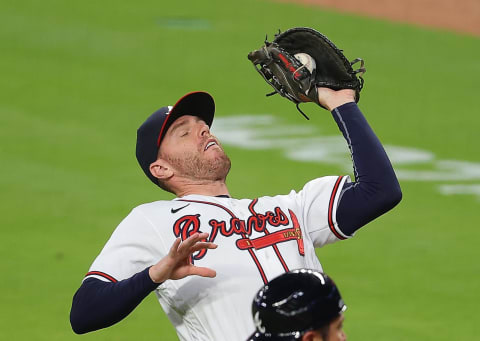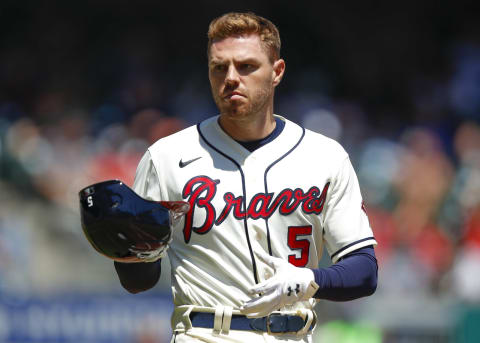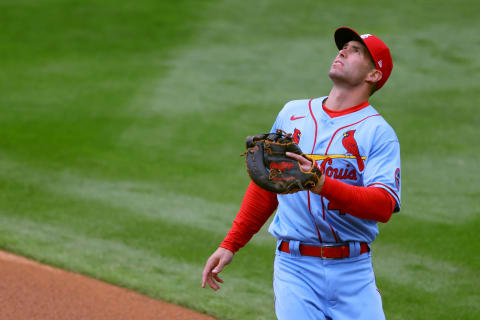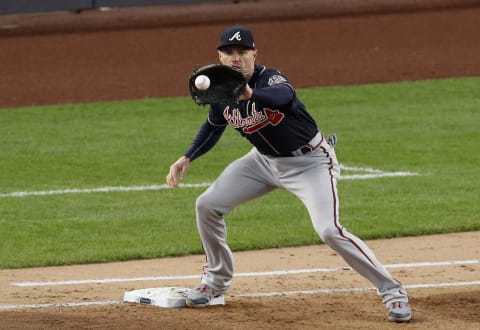Atlanta Braves news: the complexities of a Freddie Freeman contract extension


By now it’s fairly obvious that getting a new Atlanta Braves contract for Freddie Freeman isn’t going to be trivial.
The Atlanta Braves need to re-sign Freddie Freeman to an extension to keep him securely in Atlanta beyond 2021.
This is as clear as the Cardinals signing Yadi Molina, the Dodgers re-upping Clayton Kershaw, or the Mets retaining Jacob deGrom.
We’re talking about “face of the franchise” level players here — the kind you go to war for 162+ games a year and market the team with over the rest of the calendar’s days.
But nobody ever said these things were easy.
In the case of Freeman, he’s already sniffed the rarefied air of this team’s spending: his current contract (8 years/$135 million) is the longest and highest-valued one in the 150-year history of the franchise (that length record remains until Acuna and/or Albies’ option years are exercised).
Even so, there’s no arguing this point: he’s been worth every dime of that and a whole lot more.
During those years (2014-present), he’s ground out over 31 fWAR of production despite a number of nagging injuries along the way that he overcame. That values out to something close to double the contract’s value.
Oh, and he’s the current reigning MVP of the National League.
So what’s the problem here? Unfortunately, there’s several things involved.
Let’s address a few:
1. The Braves Financial Climate.
This isn’t just about the Atlanta Braves — it’s about baseball in general. Sure: eight players (Trout, Betts, Lindor, Tatis Jr., Harper, Stanton, Cole, and Machado) have all received contracts topping $300 million in recent years… but that’s not where either the Braves or Freeman are at.
The impact of COVID-19 to the sport has been keenly felt by most clubs, and that will continue to be a problem for multiple years to come. While the “elite” will continue to get paid, there will be a profound impact on player compensation at all levels below that threshold.
The guess here is that it will take some additional time, but that the Braves will have to eventually come around to the correct contract pay-point… which we’ll discuss further along.

2. The AAV conundrum.
You might be thinking “Look — Freeman is getting $22 million this year. Bumping him to $25 million is only a $3 million raise… the Atlanta Braves should be able to afford that.”
Assuming that the $25 million figure is the right number (I don’t think so; read on about that), there’s still an issue beyond whether a particular salary is ‘affordable’.
For luxury tax purposes, the Atlanta Braves and all other teams use a contract’s Average Annual Value (AAV) when determining whether a payroll has exceeded the taxing provisions in the MLB Collective Bargaining Agreement.
Right now, Freeman’s AAV is actually $16.875 million. So a new contract would bump that number by at least $10 million (between salary and benefits). Whether Atlanta can “afford” that or not isn’t as relevant as whether they can continue to build their future rosters while staying clear of the luxury tax thresholds… which they were bumping up against in 2019.
3. That Collective Bargaining Agreement
Yeah – that expires in another 7 months, and who knows what kinds of changes might be involved… or what kind of labor issues will the two sides choose to balk at this time around?
One might anticipate some additional headroom for that luxury tax threshold, but the real battle is probably going to be over this idea of how to pay players in their prime years when they are actually generating that prime production.
At this time, the arbitration system artificially generates upward “steps” for players during these years that suppress the salaries at a time when many are already hitting and pitching at elite levels.
So any changes here, and teams will suddenly be forced to boost their payrolls earlier — possibly to the detriment or older, established stars.
That’s all speculation… but it’s also relevant, as the Braves might need to “read the room” as time goes on to guess what changes might happen that could impact the rest of their roster.

4. So how much is Freeman worth? And for how long?
Given the player, his position, his age (31… will turn 32 in September), and his abilities, Freeman appears to be one that could continue to hit at a high level for several more years.
Here are some recent “comps” to consider:
Eric Hosmer (Padres, 1B). 8 years, $144 million from Padres through 2025.
- Contract issued prior to 2018 season; $18mm AAV
- Current age roughly same as Freeman
- Contract was widely considered to be an overpay at the time.
- Production: about half that of Frreeman
Paul Goldschmidt (Cardinals, 1B). 5 years/$130m (prior to 2020 season).
- Generally considered fair, $26mm AAV
- Includes bonuses of up to $2 million per year for MVP/AS/GG
- Age was equivalent then to Freemans age now
- Production: dropped off somewhat since joining St. Louis, but not significantly so (unless 2021 represents a new trend)
Christian Yelich (Brewers, OF). 9 years, $215 million + option
- $23.89mm AAV
- Currently 29½ years old
- Contract in effect in 2020.
- Recent league MVP, but comp is not strong here.
Anthony Rendon (Angels, 3B). 7 years, $245 million.
- $35mm AAV. Not a strong comp, given positions involved.
- Currently 30 years old; 31 in ealy June.
- Contract took effect in 2020.
- Total prior WAR comparable to Freeman’s; strong MVP vote ranks.
Given these, Goldschmidt is likely the closest/best comp involved. First baseman also tend to age better than players at the “skill” positions (a phrasing that tends to denigrate 1B, but that’s truly not intended).
Over their careers, Goldschmidt and Freeman look like this:
- OPS+ 141 (Goldy); 138 (Freeman)
- Homers: 252 / 247
- Average: .292 / .294
- MVP: 2nd twice / Winner once
- Gold gloves: 3 / 1
- Silver slugger: 4 / 2
- All-Star: 6 / 4
- Years in league: 11 / 12
- Games: 1335 / 1431
So let’s take all of this and see if we can roll up a contract proposal that makes sense for both sides…

And the Answer is…
Based on all of this, the size of contract the Atlanta Braves should be offering Freeman appears to be on the order of this: 5 years at $28 million per season: $140 million total.
As noted previously, that’s still a big hit to the AAV figure even though it’s not terribly much more than he’s already getting.
If there are still team monetary concerns with this level of payment, then perhaps a backloading of the deal would be acceptable… as was done with Ozuna’s recent contract.
Given Freeman’s stated desire to be with the Braves for the rest of his playing days, it would be appropriate to pursue up to 3 more option years at a more modest rate — say $20m/18m/16m or so.
At the 5-year level, this would take him through his age 36 season (he would be 37 at season’s end in 2026). This also would coalesce with other extended contracts of his teammates thusly:
- Ozuna: through 2024; 2025 option
- Acuna: through 2026; options for 2027 and 2028
- Albies: through 2025; options for 2026 and 2027
In the meantime, these contracts expire along the way:
- d’Arnaud: after 2021
- Martin: after 2021
- Morton: after 2021
- Smyly: after 2021
- Inciarte: after 2021 if option not exercised (likely)
- Smith: 2022 or 2023 (if option exercised)
So the Atlanta Braves don’t have a lot of extended deals of concern.
Of note, however: they do not have any starting pitcher under a long-term deal beyond regular team control. Furthermore, the farm system pitching pipeline is drying up, and getting pitchers like Anderson, Soroka, and Fried into long-term deals might become a priority soon.
Next. Roster Returns. dark
But that represents another discussion for another day.